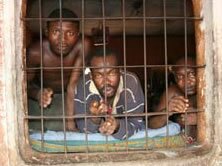 |
Friday, 23 April 2010 - Amnesty International has condemned a reported move by Nigerian state governors to execute death row inmates to ease overcrowding and urged the authorities to instead address the underlying problems in the criminal justice system. According to media reports, Theadore Orji, governor of the south-eastern state of Abia, announced this after a meeting of 36 state governors in the country's capital Abuja on Tuesday. "More than three of every five prison inmates in Nigeria have not been convicted of any offence; instead they wait years for their trial in appalling conditions," said Aster van Kregten, Amnesty International's Nigeria researcher.
"It is shocking to suggest that executing prisoners is a way around this problem."
According to Nigeria's Minister of the Interior, the total prison population is 46,000, of which some 30,000 are awaiting trial. Few can afford a lawyer and the government funded Legal Aid Council only has around 100 lawyers. There are currently more than 870 death row inmates, including women and juveniles.
Amnesty International research shows that many death row prisoners may be innocent as Nigeria's justice system is riddled with flaws. Many have been sentenced to death after blatantly unfair trials.
Trials can take more than 10 years to conclude. Appeals in some death row cases have been pending for a decade. Some never happen because case files have been lost.
International law prohibits the use of the death penalty for crimes committed by people under the age of 18, yet in Nigeria juvenile offenders continue to be sentenced to death.
Two expert groups set up by former president Obasanjo – the National Study Group on Death Penalty (2004) and the Presidential Commission on Reform of the Administration of Justice (2007) – recommended a moratorium on executions because the criminal justice system can not guarantee a fair trial.
"Federal and state authorities must not ignore the recommendations of their own study groups, Nigerian NGOs and other international organizations which have all found Nigeria's justice system to be woefully inadequate," said Aster van Kregten. "Until these underlying problems are addressed, Nigeria's prisons will remain overcrowded."
Background
In November 2008, the African Commission on Human and Peoples' Rights at its 44th Ordinary Session in Abuja, Nigeria, adopted a resolution calling on state parties to the African Charter on Human and Peoples' Rights to observe a moratorium on the death penalty.
In December 2007 and 2008, the UN General Assembly also adopted two resolutions on the use of the death penalty calling upon states that still maintain the death penalty to progressively restrict the use of the death penalty; reduce the number of offences for which it may be imposed and establish a moratorium on executions with a view to abolishing the death penalty.
While Nigeria did not adopt an official moratorium on executions, the Federal Minister of Foreign Affairs stated in February 2009 at the 4th Session of the United Nations Universal Periodic Review (UPR) that Nigeria has a "self imposed moratorium"
Any step by the Nigerian government, state or federal, to resume executing will be contrary to commitments made by Nigeria at international level.
|